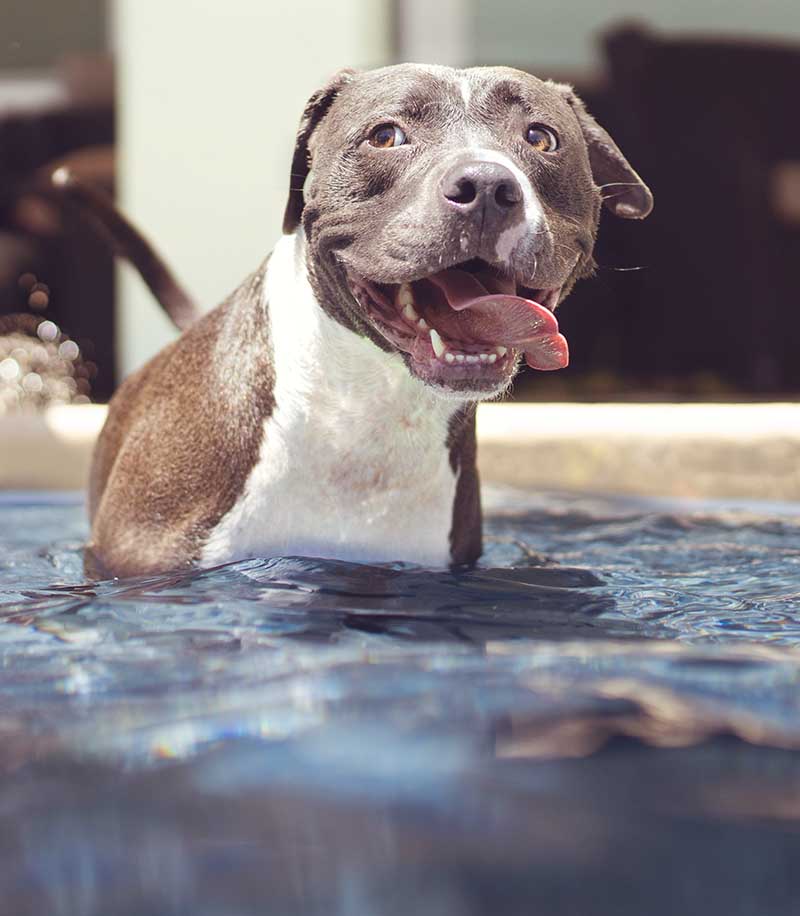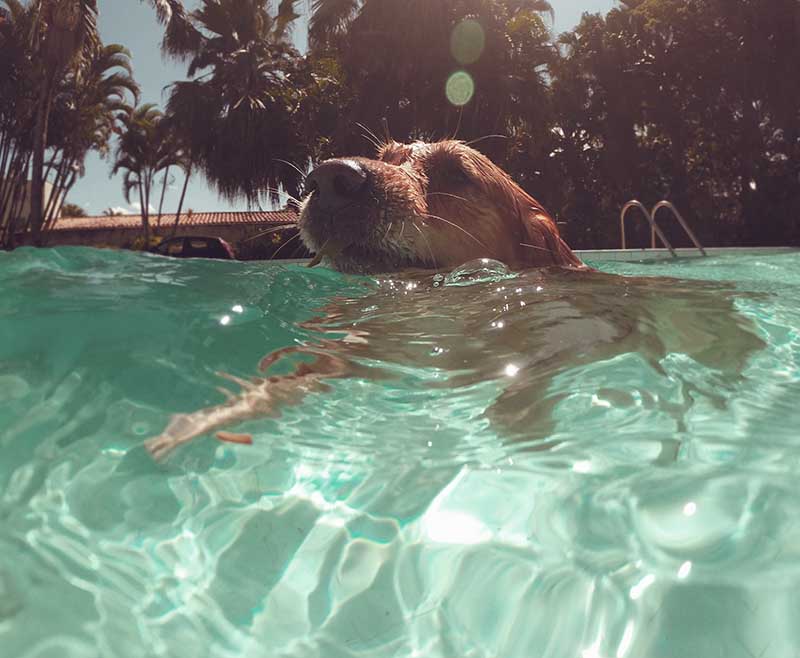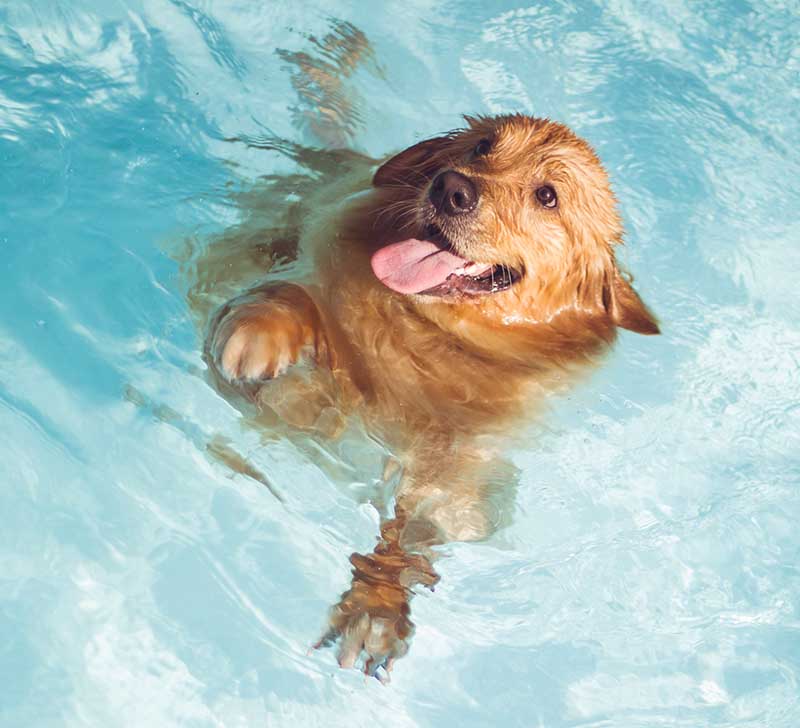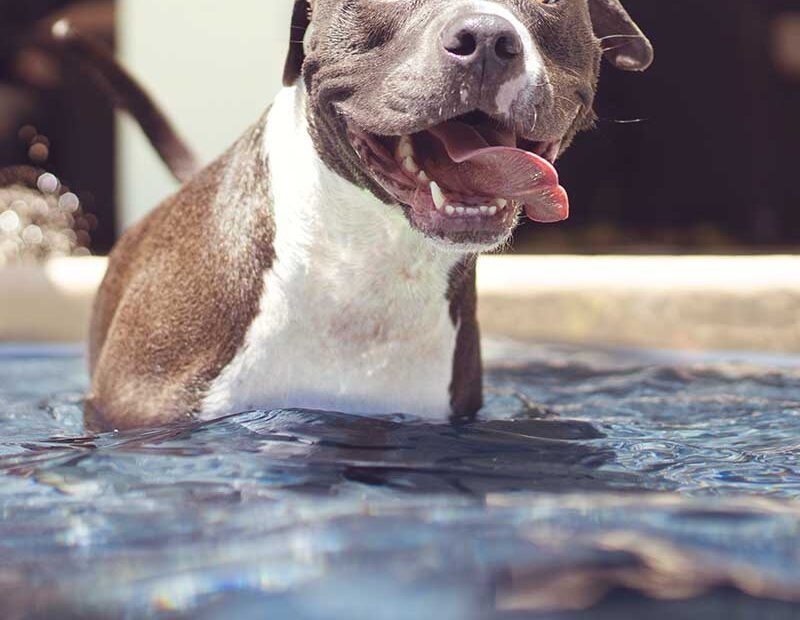Swimming is a tremendously fun activity for both dogs and people alike. Who doesn’t like to have a splash around to cool off in the hot summer months? And if you are a dog, then you will love to swim in any weather no matter what time of year it is! However, not all water sources are created equal. There is a big difference between letting your dog swim in a chlorinated pool and saltwater pool. Many dog owners even ask if it is safe to let their dog swim in saltwater pools. In this article, Emma Charles, DVM, investigates the safety aspect of these types of water pools and which one is best for your dog.
Can Salt Water Hurt Dogs?
Obviously, the sea is salty. We know that, but your dog does not. When they are playing on the beach and running around in the sun they will work themselves up a thirst. A thirsty dog will head for the nearest water source without giving it a thought in the same way that we would. Common sense tells us to avoid sea water, but just as with children, we have to teach dogs not to drink salty water.

Can Dogs Drink Salty Water?
No, drinking salty water can be harmful to your dog and can even be fatal. It is natural for a dog to gulp down a few mouthfuls of seawater and if this does occur, do not panic. The worst-case scenario for a dog who has consumes a small amount of this substance will be fine. They may even develop a small level of diarrhoea in some cases. This is natural and is not a cause for concern on its own. Your dog should recover within a few days. The next time you visit the beach, however, try to take action to discourage your dog from engaging in this behavior again. A tin can filled with stones can be an effective training aid in this environment. You should be able to gain your dog’s attention using this deterrent.
What to Do if Your dog Consumes a Lot of Salty Water
In some cases, your dog may get very thirsty and consume a large amount of salt. This can be serious and may even be fatal. At this time, there is no specific treatment for dogs who drink too much seawater, so it is best to take preventative action before this occurs.
The best thing a veterinarian can do for your dog is make an attempt to restore the level of homeostasis and electrolyte balance in your dog’s body. Your local vet can insert an IV into your dog’s bloodstream and monitor your dog overnight for any troubling signs. Too much sodium in the bloodstream can cause swelling of the brain and seizures, so this is what your dog’s vet will be looking out for. This is why they will have to stay at the vet’s surgery for a time.
Are Saltwater Pools Safe For My Dog to Swim In?
Yes, for the most part, a dog can swim in a saltwater pool. These pools are typically ten times less salty than the ocean. And dogs love to swim and frolic around in the waves of the sea! Your dog may even take a few gulps of the water as they are splashing about. This is quite normal and if you see the safety aspect above, you will notice that there are risks to letting your dog do this. Whenever I see dog owners watch their dog drinking seawater, I want to shout at them to stop. Most people think that dogs can handle this type of water as their systems are different. But in reality, this is not the case for most things. Sodium works on a dog’s body just as it does with a human. It is dangerous and you should always discourage your dog from drinking anything other than fresh water.
Saltwater and Your Dog’s Skin
This type of water can be bad for a dog’s skin as it can cause dryness and irritation. Basically, high levels of sodium can leech moisture and drive out essential oils from the epidermis beneath the fur. Your dog’s coat will retain this salt and you should give them a good wash afterwards. There are also small amounts of chlorine, even in salted pools.

Get your pooch lathered up afterwards
It is as important to wash these elements from your dog just as you would if they had given themselves a mud bath. You may notice if you do not bathe your dog after this type of activity that they will scratch a lot. So if your pet has visited a doggy swimming pool, it may not be that he has suddenly caught fleas from the other pooches.
Do not wash your dog before they go swimming
Always let your dog go swimming in its natural state. That is, do not attempt to wash your dog clean before they get into the swimming pool. This is because your dog’s skin has natural oils beneath its fur. They have active sebaceous glands just as we do in our own epidermis layer. These glands secrete a substance known an sebum. This is what keeps your skin moist and supple. Think of it as a natural moisturiser. Your dog has it too and if you bath them too regularly or before they swim in a saltwater pool then you are actually doing the a disservice.
Always allow several hours to a day after their bath before you let them swim in a pool of this kind. This is especially true if you are using this form of activity as exercise and let your dog splash about regularly.

Saltwater VS Chlorinated Pools – Which is Better For Dogs to Swim in?
No matter what type of pool you have, it is important for all users of the pool that you keep the system maintained and hygienic. This is especially true if your dog uses the pool regularly. Saltwater pools may give the impression that they are an alternative to chlorine, but the truth is that they still contain the chemical, just at a smaller concentration.
This chlorine can still irritate a dog’s skin and eyes. There is still much debate over which one is better for your dog, but generally speaking, saltwater comes up at the top. True, there is the risk of your dog drinking water that has high levels of sodium, but they should not consume chlorine either. Ultimately, the choice is yours, but as a vet, the more natural option is best as it is akin to a less concentrated ocean. But it is a much safer environment for your dog to swim in.
To sum up
Hopefully, this should help you to decide whether or not to let your dog swim in your home saltwater pool. It is perfectly fine for a dog to enjoy swimming with the rest of the family in a well-maintained facility. Just remember to take good care of their skin and don’t bathe them before they jump in.
